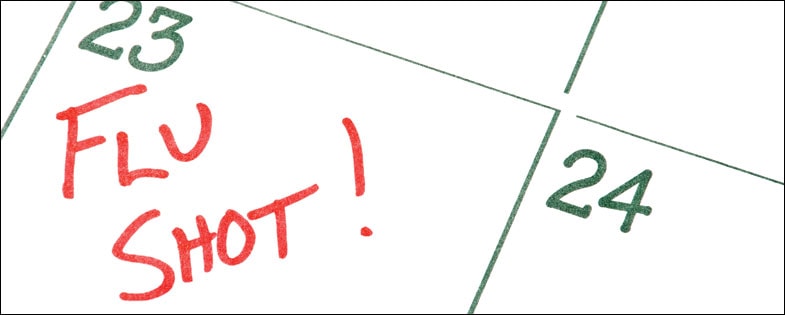It’s that time of year again. Summer is slowly transitioning to fall, which means it’s time to think about apple picking, cooking hearty soups, and getting your annual flu shot. The Centers for Disease Control and Prevention (CDC) recommend that everyone above the age of 6 months get an annual flu shot. The ideal time to get your flu shots is between September and October. Below is a list of places you can find the flu shot throughout Washtenaw County. Click here to see current flu activity in the county.
Flu Shot Clinics/Health Fairs
- 9/21: Turner Senior Wellness Program Flu Shot Clinic (9:00am- noon)– Located at the Turner Senior Resource Center (2401 Plymouth Rd, Suite C). Call (734) 998-9353 to schedule an appointment.
- 10/3: Milan Health Fair (10:00am- 1:00pm)- Located at Milan Seniors for Healthy Living (45 Neckel Ct). Call (734) 508-6229 for more information.
- 10/6: Saline Health Fair (9:00am- noon)- Located at the Saline Area Senior Center (7190 N. Maple Rd). Call (734) 429-9274 for more information. To make an appointment for a flu shot or shingles vaccine, call SASC on or after Sep 11th.
- 10/13: Dexter Senior Center Wellness Fair & Flu Shot Clinic (9:00am- noon)- Call the Dexter Senior Center at (734) 426-7737 for more information.
- 10/13: Pittsfield Township Health Fair (9:00am- noon)- Located at the Pittsfield Township Senior Center (701 W Ellsworth Rd). Call (734) 822-2117 for more information.
- 10/21: Ypsi Township 50 & Beyond Flu Shot Clinic (noon-4:00pm)- Located at the Ypsi Township Community Center (7200 S. Huron River Dr). Call (734) 544-3800 for more information.
Pharmacies
- Ann Arbor Pharmacy
- CVS (Accepts most insurance/$75-$103 without insurance)
- Tip: If you schedule your vaccine at a CVS inside a Target store you can get a coupon for $5 off a $25 purchase!
- Costco (Accepts most insurance/flu shots starting at $20 without insurance)
- Jensen’s Community Pharmacy (Locations in Dexter and Saline)
- Kroger Pharmacy (Accepts most insurance/$28-$68 without insurance)
- Meijer Pharmacy
- Rite Aid (Also offering $5 off $25 purchase coupon with vaccine)
- Saline Pharmacy
- Walgreens (Accepts most insurance/$42.49-$76.99 without insurance. Also offering $5 Walgreens Cash rewards)
- Walmart Pharmacy
Other Resources
- Washtenaw County Health Department (555 Towner Street, Ypsilanti, 48198)- call (734) 544-6700 to schedule an appointment.
- VaccineFinder.org
Stay safe and healthy!






